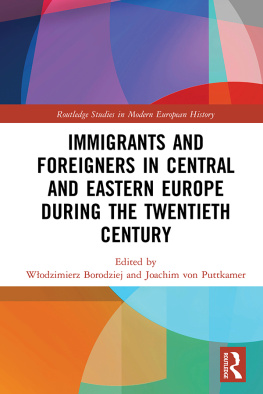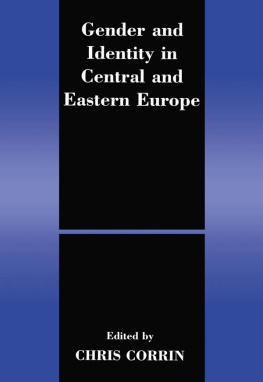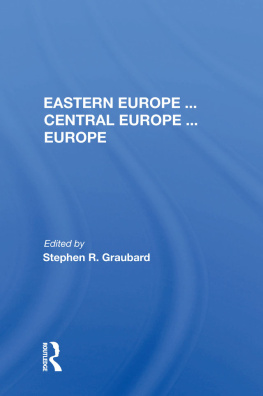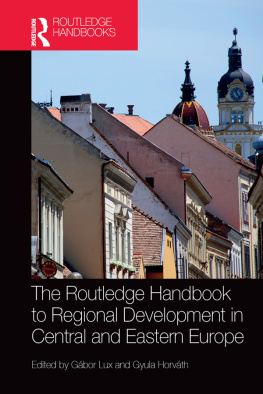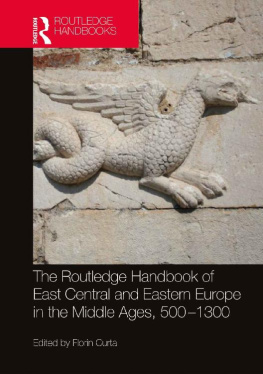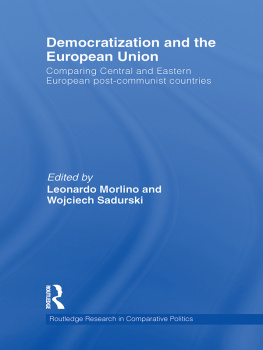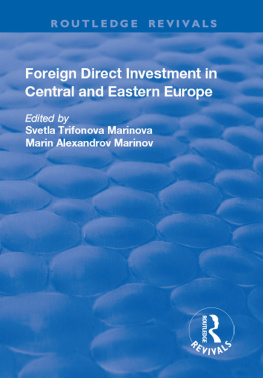
The Routledge History Handbook of CENTRAL AND EASTERN Europe in the Twentieth Century
Intellectual Horizons offers a pioneering, transnational and comparative treatment of key thematic areas in the intellectual and cultural history of Central and Eastern Europe in the twentieth century.
For most of the twentieth century, Central and Eastern European ideas and cultures constituted an integral part of wider European trends. However, the intellectual and cultural history of this diverse region has rarely been incorporated sufficiently into nominally comprehensive histories of Europe. This volume redresses this underrepresentation and provides a more balanced perspective on the recent past of the continent through original, critical overviews of themes ranging from the social and conceptual history of intellectuals and histories of political thought and historiography, to literary, visual and religious cultures, to perceptions and representations of the region in the twentieth century. While structured thematically, individual contributions are organized chronologically. They emphasize, where relevant, generational experiences, agendas and accomplishments, while taking into account the sharp ruptures that characterize the period.
The third in a four-volume set on Central and Eastern Europe in the twentieth century, it is the go-to resource for understanding the intellectual and cultural history of this dynamic region.
Wodzimierz Borodziej is Professor of History at Warsaw University, Poland.
Ferenc Lacz is Assistant Professor of History at Maastricht University, the Netherlands.
Joachim von Puttkamer is Professor of Eastern European History at Jena University, Germany and Co-Director of the Imre Kertsz Kolleg, Germany.
The Imre Kertsz Kolleg at the Friedrich Schiller University in Jena is an institute for the advanced study of the history of Eastern Europe in the twentieth century.
The Kolleg was founded in October 2010 as the ninth Kte Hamburger Kolleg of the German Federal Ministry for Education and Research (BMBF). The directors of the Kolleg are Professor Joachim von Puttkamer and Dr Michal Kopeek. Professor Wodzimierz Borodziej was the Kollegs co-director from 2010 to 2016 and is now chairman of its advisory board.
THE ROUTLEDGE TWENTIETH CENTURY HISTORY HANDBOOKS
The Routledge History Handbook of Central and Eastern Europe in the Twentieth Century
Volume 1: Challenges of Modernity
Edited by Wodzimierz Borodziej, Stanislav Holubec and Joachim von Puttkamer
The Routledge History Handbook of Central and Eastern Europe in the Twentieth Century
Volume 2: Statehood
Edited by Wodzimierz Borodziej, Sabina Ferhadbegovi and Joachim von Puttkamer
The Routledge History Handbook of Central and Eastern Europe in the Twentieth Century
Volume 3: Intellectual Horizons
Edited by Wodzimierz Borodziej, Ferenc Lacz and Joachim von Puttkamer
For more information about this series, please visit: www.routledge.com/The-Routledge-Twentieth-Century-History-Handbooks/book-series/RHHC20.
First published 2021
by Routledge
2 Park Square, Milton Park, Abingdon, Oxon OX14 4RN
and by Routledge
52 Vanderbilt Avenue, New York, NY 10017
Routledge is an imprint of the Taylor & Francis Group, an informa business
2021 selection and editorial matter, Wodzimierz Borodziej, Ferenc Lacz and Joachim von Puttkamer; individual chapters, the contributors
The right of Wodzimierz Borodziej, Ferenc Lacz and Joachim von Puttkamer to be identified as the authors of the editorial material, and of the authors for their individual chapters, has been asserted in accordance with sections 77 and 78 of the Copyright, Designs and Patents Act 1988.
All rights reserved. No part of this book may be reprinted or reproduced or utilised in any form or by any electronic, mechanical, or other means, now known or hereafter invented, including photocopying and recording, or in any information storage or retrieval system, without permission in writing from the publishers.
Trademark notice: Product or corporate names may be trademarks or registered trademarks, and are used only for identification and explanation without intent to infringe.
British Library Cataloguing-in-Publication Data
A catalogue record for this book is available from the British Library
Library of Congress Cataloging-in-Publication Data
Names: Borodziej, Wodzimierz, editor. | Ferhadbegovi, Sabina, editor. | Puttkamer, Joachim von, editor.
Title: The Routledge history handbook of Central and Eastern Europe in the twentieth century / edited by Wodzimierz Borodziej, Sabina Ferhadbegovi and Joachim von Puttkamer.
Other titles: Central and Eastern Europe in the twentieth century
Description: New York : Routledge, 2019- | Series: Routledge twentieth century history handbooks | Volume 1 title information from publishers website. | Includes bibliographical references and index. | Contents: [Volume 1. The Challenges of Modernity]Volume 2. Statehood
Identifiers: LCCN 2019049033 (print) | LCCN 2019049034 (ebook) | ISBN 9781138301665 (hardback) | ISBN 9780367822118 (ebook)
Subjects: LCSH: Europe, CentralPolitics and government1989- | Europe, EasternPolitics and government1989- | Post-communismEurope, CentralHistory20th century. | Post-communismEurope, EasternHistory20th century.
Classification: LCC DAW1051 .R68 2019 (print) | LCC DAW1051 (ebook) | DDC 943.009/04dc23
LC record available at https://lccn.loc.gov/2019049033
LC ebook record available at https://lccn.loc.gov/2019049034
ISBN: 978-1-138-30165-8 (hbk)
ISBN: 978-1-003-05549-5 (ebk)
ISBN: 978-0-367-51865-3 (set)
Wodzimierz Borodziej and Joachim von Puttkamer
What were the central twentieth-century experiences for Eastern European societies? Depending on whom you ask and depending on which country their thoughts intuitively drift towards, the answer is likely to be quite different. The answer could refer to significant dates, such as the 1939 MolotovRibbentrop Pact, the 1956 Hungarian uprising, the Prague Spring of 1968 or the year of Solidarity in 19801981. It could also revolve around the experiences in various countries the Stalinist deportations left deep scars in the Baltic states, as did the wars of the 1990s in former Yugoslavia. The thoughts of a Western European are likely to jump to 1989 and the collapse of communist rule perhaps also to the disappointed (or at least unlikely) prospects of a unified Europe. Hopefully, he or she might learn something from this volume.
As that Western European will discover, there were particular as well as shared experiences. The volumes presented here focus on both, grouped around what the editors regard as central, overarching themes. To emphasize the experience of Violence (vol. 4) is just as obvious as prioritizing the manifold Challenges of Modernity (vol.1) of a region that has often been described and perceived by its own inhabitants as the periphery of Europe. The need to address the transformation of Statehood


